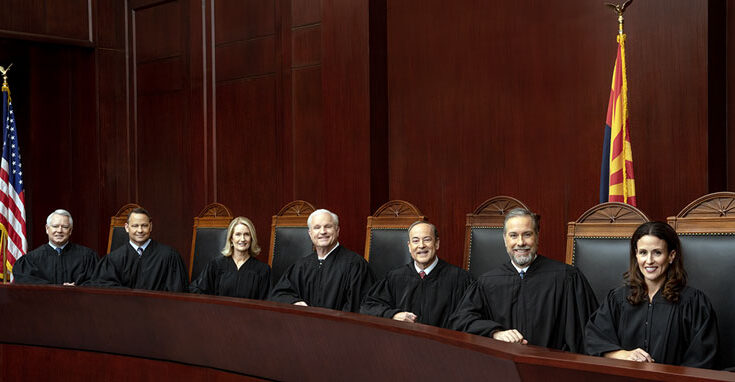Photo Courtesy Arizona Supreme Court: On Tuesday, the Arizona Supreme Court upheld an 1864 ban on abortion.
The statewide ban had been blocked while Roe was the law of the land. It will prohibit abortion except to save the life of the pregnant person.
By Shefali Luthra, Grace Panetta, Jessica Kutz/The 19th
PHOENIX – Abortion will be almost completely illegal in Arizona following a ruling issued Tuesday by the state’s Supreme Court that upholds a ban passed in 1864.
The law, passed decades before Arizona became a state, was never repealed, though it was blocked after the U.S. Supreme Court issued its decision in Roe v. Wade in 1973. Since then, the law was only temporarily enforced in the fall of 2022, after the U.S. Supreme Court overturned Roe in Dobbs v. Jackson Women’s Health Organization. The ban has a very limited exception to save the life of the pregnant person, a carveout physicians say is incredibly difficult to use in practice.
“A policy matter of this gravity must ultimately be resolved by our citizens through the legislature or the initiative process. Today, we decline to make this weighty policy decision because such judgments are reserved for our citizens. Instead, we merely follow our limited constitutional role and duty to interpret the law as written,” Justice John R. Lopez wrote in the court’s opinion.
That interpretation, he continued, is that “Roe’s recognition of a right to an abortion was not absolute, and many states — including Arizona — legislatively restricted the time, place, and manner in which an abortion could be performed. … Arizona has never independently created a statutory right to abortion.”
Today’s decision will not take effect right away. The court’s majority extended a stay against the 1864 law for 14 days and remanded the case to a lower state court in case it wishes to consider other constitutional arguments made by Planned Parenthood, which had filed the current suit challenging the law.
“I’m devastated by this decision, and I know many Arizonans are as well and trying to figure out what this means,” Democratic Gov. Katie Hobbs said during a Tuesday press conference following the ruling. “We know that IVF is under attack. We know that contraception is under attack.”
During a press conference shortly after the ruling, Angela Florez, CEO of Planned Parenthood Arizona, the state’s largest abortion provider, told reporters that she anticipates the organization will continue providing abortions for almost two months — the point at which they believe the decision would be enforced.
Though the organization has the ability to raise other constitutional arguments in the lower Arizona court, Planned Parenthood representatives did not immediately articulate what other challenges they could raise.
Only six of the Arizona court’s seven justices weighed in on the case. The seventh, conservative justice Bill Montgomery, recused himself after reporting by The 19th highlighted his previous comments on abortion, and in particular about Planned Parenthood, one of the parties in the lawsuit.
The ruling means abortion will be almost completely outlawed in 15 states. In two more, South Carolina and Georgia, six-week bans are currently in effect, and another such law will go into effect in Florida on May 1.
The near-total ban represents a massive loss of abortion rights in Arizona. Previously, the procedure had been available up until 15 weeks of pregnancy — a cutoff still earlier than what is legal in the majority of states, but after the point at which most abortions occur.”
Anti-abortion groups including Susan B. Anthony Pro-Life America and Students for Life celebrated Tuesday’s ruling. The Alliance Defending Freedom, the conservative legal organization that has led many anti-abortion lawsuits, called the decision “a significant ruling that will protect the lives of countless, innocent unborn children.”
Already, patients have asked if their abortion appointments must be canceled because of the new law, said Dr. Jill Gibson, medical director of Planned Parenthood Arizona and a practicing OB/GYN. “It’s an untenable situation and extremely unfortunate.”
Once the ban takes effect, the closest options for Arizonans seeking abortions will be clinics in New Mexico, southern California, and Nevada. The decision will also likely put more pressure on organizations like the Arizona Abortion Fund, a largely volunteer-staffed organization that helps people cover the cost of abortions. Close to 14,000 abortions took place in Arizona in 2021, and about 11,500 did in 2022, according to the state health department. Those numbers appear to have held steady: The most recent estimates from the Society for Family Planning found that in the first nine months of 2023, 10,010 abortions took place in the state.
“It’s going to be devastating, and as an organization, we don’t have the financial resources to fund [that many] people going out of state,” said Eloisa Lopez, the fund’s executive director.
Arizona’s attorney general, Democrat Kris Mayes, has said she would not prosecute medical providers for performing abortions. And Hobbs, the state’s governor, issued an executive order last June giving the attorney general authority over abortion-related prosecutions. Neither Hobbs nor Mayes is up for re-election until 2026. It is not clear whether the law’s language could also be used to prosecute Arizonans who support pregnant people in leaving the state for an abortion. Lopez said that her organization will continue to fund travel until advised otherwise.
Mayes reiterated that commitment on Tuesday, posting on X, the platform formerly known as Twitter, “As long as I am Attorney General, no woman or doctor will ever be prosecuted under this draconian law in our state.”
When asked in a news conference whether she was worried about legal challenges to the executive order, Hobbs said: “I say, bring it on. I would not have issued the executive order if I did not think it was legally sound.”
But the fear of violating the law once it takes effect — or of future attorneys general taking a different tactic — will likely still deter people from seeking or providing abortions in the state.
“I always plan to follow the law and I will really have to weigh the risks and benefits. That’s a personal decision I’ll have to make under counsel from lawyers,” Gibson said. “I will be phoning my lawyers for guidance on what I can do.”
Jill Habig, president and founder of the Public Rights Project, a national nonprofit that provides legal defense to public officials, said the court’s decision has tied the hands of doctors and abortion providers. The court, in its decision, wrote that: “Physicians are now on notice that all abortions, except those necessary to save a woman’s life, are illegal.”
“No legal counsel will approve or allow a doctor or a hospital to provide care that is illegal in the state,” Habig said. “You can’t get an insurance policy, you can’t expect to keep your license and you frankly can’t take the risk.”
“We’ve seen plenty of prosecutors in the state who are committed to enforcing this,” Habig said. “And so the fact of the matter is that regardless of the individual decision from prosecutors, the care itself will not be available in 14 days.”
The Public Rights Project represented Pima County Attorney Laura Conover, a party to the case, in arguing against the ban taking effect. At a press conference organized by the Biden campaign in front of the Pima County Historic Courthouse in Tucson, Conover said that the fight for abortion access was not over in the state. “You can rest assured that the Pima County Attorney’s Office now, along with the Attorney General’s office and Kris Mayes, will continue to seek resolution for the safest and healthiest community that we can have.”
Conover called it “frankly appalling” for the state to return to a law that, like the courthouse-turned-museum she was standing in front of, hails from the 19th century, when Arizona was a territory rather than a U.S. state. “How ironic that we would be here now with the state of Arizona’s Supreme Court suggesting that we go back to a near-total ban from 1864, territorial days when women and people of color didn’t even have the right to participate in their government,” she said.
Abortion rights supporters in Arizona are pushing to put a ballot measure before voters this November that would ask them to amend the state constitution, enshrining the right to an abortion up until fetal viability, a point that typically occurs around 23 to 25 weeks. The campaign, endorsed by Hobbs, reported last week that it had collected enough signatures to appear on the ballot, though it has yet to be certified.
“We are in an incredibly divisive political climate; this certainly adds to that,” Hobbs said. “I certainly think this will motivate voters in November.”
Former President Donald Trump has reportedly discussed 15 or 16 weeks as a potential national cutoff. But in a video released Monday, the presumptive GOP nominee did not endorse a federal ban and said he thought decisions should be left to individual states.
President Joe Biden, who has made abortion rights a centerpiece of his campaign, called today’s ruling the “result of the extreme agenda of Republican elected officials.” Vice President Kamala Harris announced that she will travel to Tucson, Arizona on Friday to discuss reproductive rights.
At the press conference in Tucson, city mayor Regina Romero put it bluntly: “Today, we have a choice to look ahead to a United States where access to abortion and reproductive health care and the right of people to make their own health care decisions is protected by reelecting Joe Biden and Kamala Harris, period.” She added: “Donald Trump made a statement about leaving abortion decisions up to the state; this is what that means.” In Arizona, under the 1864 ban, that will now mean no exceptions for rape or incest.
The ruling could also position abortion as a critical issue in the competitive U.S. Senate election between Democrat Ruben Gallego and Republican Kari Lake. In a statement, Gallego called the ruling “devastating for Arizona women and families” and charged that politicians like Lake are “ripping away the right for women to make their own health care decisions.”
This article originally appeared in The 19th








